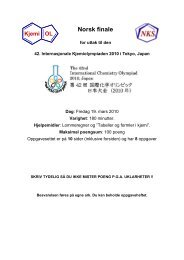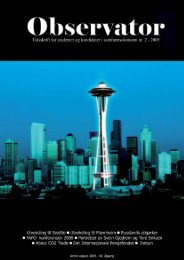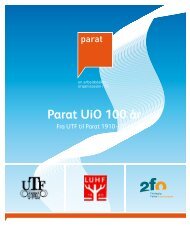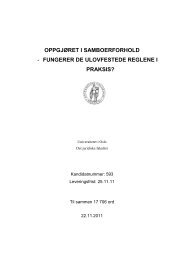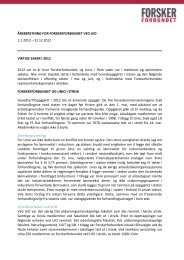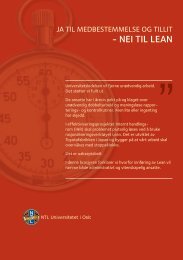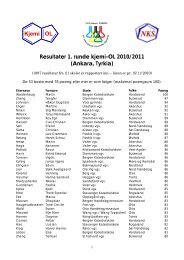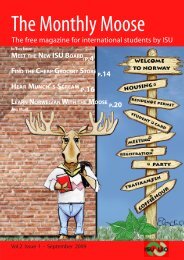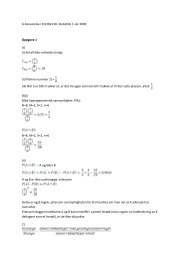filosofisk supplement - Universitetet i Oslo
filosofisk supplement - Universitetet i Oslo
filosofisk supplement - Universitetet i Oslo
- No tags were found...
You also want an ePaper? Increase the reach of your titles
YUMPU automatically turns print PDFs into web optimized ePapers that Google loves.
Se a d Zi m e r ienact in their lives. Islam is always more and less than allthese. It is more because Islam is not reducible to some,no matter how relevant, semiotic or somatic rituals. Andit is less than what the over-zealous believers imagine itto be, invoking and projecting notions that surpass eventheir capacities of imagination. Probably, as an expressionof despair, the best way to speak of Islam is to remain silentabout it. It is what each Muslim says it is, how theysee it unfolding in their lives and what gives meaning andorientation to those who are and however they are committedto its worldview. Islam by definition surpasses theKoranic event since Muslims are not bound causally by itsnorms but constantly renegotiate them as the politics oftime necessitate.In a sense, only those who are markedby Islam, who are assimilated and consumedby its fire, who are significantly transformedby its force, whose effects they live, feel andtranslate in their lives can speak meaningfullyof Islam. Those from outside (nominalMuslims included) can describe it, categorizeit in neat intellectual categories but probablynever understand the ‘subjective’ meaningsand investments that can only be experiencedbut not narrated. Islam in this sense is neithera system of Sharica (the holy Law) nor of politics.As a Sharica system Islam is all too human.As a political system, Islam is a secularscandal masquerading as divine.In the absence of a feasible Koranic hermeneuticsthat should have provided anopportunity for the problematization andconsequently the fusion of tradition and modernity withoutwreaking emotional havoc, Islam’s openness to historicalcontingencies has meant only one thing: movingaway from the horizon of the Koranic event whilst payinglip service to some ritualistic practices devoid of anyproper meaningful content. In this process only the nameof Islam has remained unchanged, or to be more precise,Islam has been reduced to some meaningless practices tobe used from time to time to serve certain ideological andmostly retrograde and backwards programmes. Earlier attemptsfrom the days of colonization have all failed as genuineprogrammatic solutions in integrating the scientific(or others related to the advent of modernity) propositionsinto the horizon of Islamic meaning and ended up in oneform or another of eclectic reconciliation. 18 The discontentwith and the failure of the direct return to the mythicalHowever, the thesis thatmodern Islam standsfor some substantial coherentvision is a puredeceptive lure designedby its architects to hidethe truly difficult problemof the relations ofMuslims to Islam andthe insurmountablegaps and conflicts ofposture between Islamas a body of doctrinesand Muslims as peoplesliving under thehegemonic regime ofmodernity.horizon of the Koranic event is evident: modern Muslimsare not satisfied with the Koranic expression of Islam. 19Many are unable and unwilling to succumb to those sortsof temptations. Islamic feminism, as the newest versionof the principled discursive engagement with the scripture,has demonstrated that such unmediated and naïvereturns to the founding act are impracticable and counterproductive.The truth of Islam or the form of the Koranicevent, which was rendered into the Koranic idiom, is unbearable;staged in the position of the alien or an unwantedguest, if not directly suffocating for the contemporaryconditions under which Muslims live.What contemporary Muslims are missing, therefore,is the ability to, not objectively but, subjectively makethe Koranic message their own. Objectivelyof course Muslims are speaking of a return toIslam, to an Islam appropriated only from aninterpassive position. What is Islam returned,intruded into the modern space if not a bigideological machine or ritual where Muslimscan lose themselves by hiding behind itsobjective and normative rituals! By freeingthemselves from the sense of responsibilityof subjective appropriation, it is Islam as abig ideological machine which believes forall of them. Beliefs are delegated to Islam inan interpassive way – believing through theother, the medium which figuratively performsand takes over our beliefs for, ‘we donot have to believe for others to have the illusionthat we believe’ as the Austrian philosopherRobert Pfaller reminds us. The returnedIslam, whether in the form of an Islamic state or Islamicmodernity or even Islamic terrorism serves as an ‘anonymousillusion.’ An illusion that takes place in the mediumof the ‘other’s’ ideology. An illusion without a subject for,‘when the objective belief is there, the religious subjectcan go away’. 20 Consequently this therefore necessitatesthe following result: the more anachronistic such a returnto the founding act is, the more appealing and acceptableit becomes. There is an asymmetrical and disproportionalconfiguration between the simple and the anachronisticreturn to the founding act. It increases to the extent thatIslam becomes an ‘Islam without Islam,’ and it decreasesto the extent that Islam becomes more Islamic, or comescloser and more faithful to the degree this is possible to theKoranic event as it is rendered in the Koran itself.The closer Islam comes to its ‘pristine’ form, the grea-8



